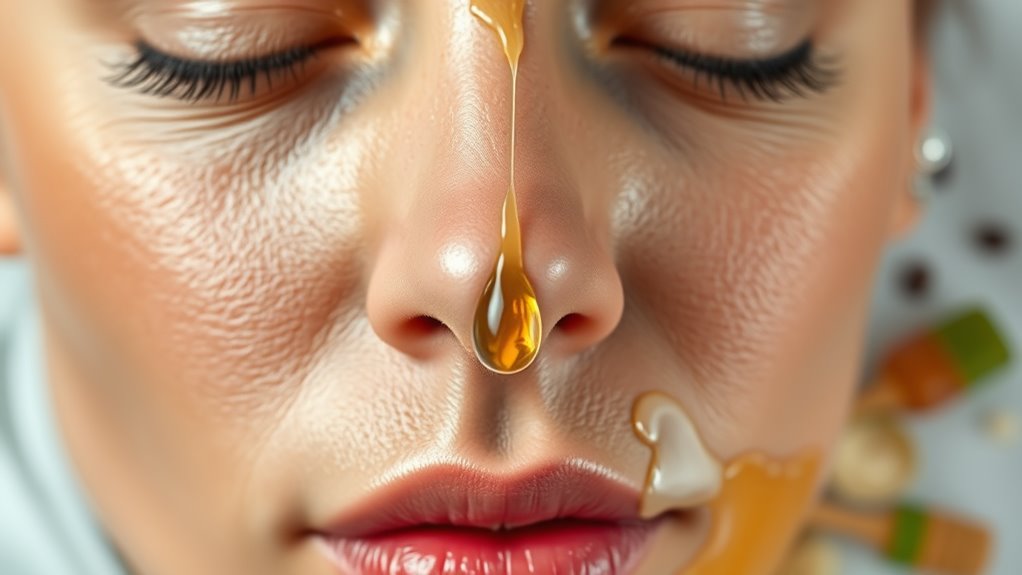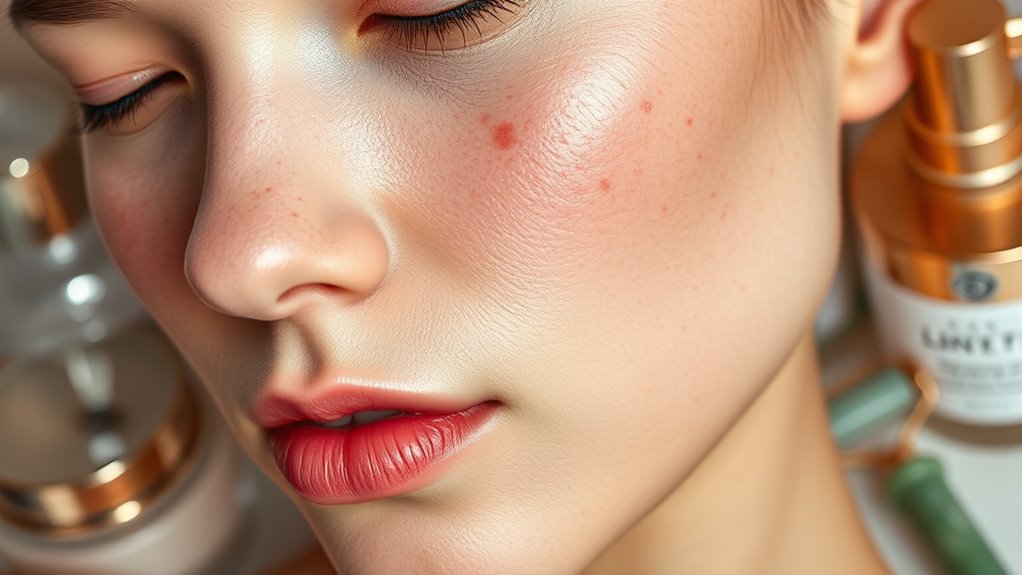How to Stop Acne Before It Starts – Even If Nothing Has Worked Before
To stop acne before it starts, focus on understanding its causes, like hormonal fluctuations and excess sebum. Establish a consistent skincare routine that includes gentle cleansing and moisturizing tailored to your skin type. Choose products with active ingredients like salicylic acid, and maintain a balanced diet rich in antioxidants and omega-3s. Managing stress and staying hydrated also play crucial roles. When you implement these strategies, you’ll effectively reduce your chances of breakouts—and there’s more to discover.
Key Takeaways
- Establish a consistent skincare routine with a gentle, pH-balanced cleanser to remove excess oil and impurities daily.
- Choose products containing active ingredients like salicylic acid to unclog pores and prevent breakouts.
- Maintain a balanced diet low in high-glycemic foods and rich in antioxidants to support skin health.
- Manage stress through mindfulness practices and regular exercise to reduce oil production and inflammation.
- Consult a dermatologist for personalized treatment plans if over-the-counter products have proven ineffective.
Understanding the Causes of Acne
Acne results from a complex interplay of factors that affect your skin’s health. Hormonal fluctuations, particularly during puberty or menstruation, increase oil production in your skin. This excess sebum clogs pores, leading to the proliferation of acne-causing bacteria.
Additionally, genetic predisposition can make you more susceptible to breakouts. Environmental factors, like pollution and humidity, further exacerbate this condition.
To mitigate these risks, you should adopt effective acne prevention tips. Regularly cleanse your skin with a gentle, non-comedogenic cleanser to remove excess oil and dirt. Incorporating ingredients like salicylic acid or benzoyl peroxide can help regulate oil production and prevent clogged pores.
Moreover, preventing acne before it starts is often more effective than treating it after it appears, highlighting the importance of proactive skincare.
Staying hydrated and maintaining a balanced diet also aids in promoting healthier skin, reducing the likelihood of acne.
Establishing a Consistent Skincare Routine
To effectively combat acne, establishing a consistent skincare routine is crucial.
Daily cleansing removes excess oil and impurities, reducing the likelihood of clogged pores. Additionally, moisturizing helps maintain balanced skin, preventing dryness that can trigger further breakouts. One common mistake is not cleansing properly, which can lead to increased acne breakouts.
Daily Cleansing Importance
Many people underestimate the power of daily cleansing in their skincare routine. A consistent cleansing regimen removes excess oil, dirt, and dead skin cells that can clog pores and lead to acne.
When you cleanse daily, you’re preventing the buildup of impurities that disrupt your skin’s natural balance. Choose a gentle, pH-balanced cleanser tailored to your skin type; harsh products can trigger irritation and exacerbate acne.
Cleansing not only prepares your skin for subsequent treatments but also enhances absorption, maximizing the effectiveness of active ingredients.
Moisturizing for Balanced Skin
While cleansing is essential for clear skin, moisturizing plays a crucial role in maintaining balance and preventing breakouts. When your skin lacks moisture, it can overproduce oil, leading to clogged pores and acne.
Choose a lightweight, non-comedogenic moisturizer that hydrates without contributing to excess oil. Ingredients like hyaluronic acid and glycerin attract moisture, while ceramides help restore the skin barrier.
Apply moisturizer consistently, ideally after cleansing, to lock in hydration. This step is vital, even for oily or acne-prone skin, as it helps regulate oil production.
Choosing the Right Products for Your Skin Type
To effectively treat acne, you need to identify your skin type—whether it’s oily, dry, combination, or sensitive.
This knowledge helps you choose products with the right ingredients that target your specific concerns.
Look for active components like salicylic acid or benzoyl peroxide that can combat acne, while also ensuring they align with your skin’s needs. Salicylic acid is particularly effective because it penetrates deep into the pores, helping to unclog and exfoliate the skin, thus preventing future breakouts.
Identify Your Skin Type
How can you effectively choose products that cater to your specific skin type? First, identify whether your skin is oily, dry, combination, or sensitive. Oily skin often exhibits excess shine and enlarged pores, while dry skin may feel tight and flaky.
Combination skin shows characteristics of both, with oiliness in the T-zone and dryness elsewhere. Sensitive skin reacts easily to products, leading to redness or irritation. Conduct a patch test to gauge reactions, and observe how your skin behaves throughout the day.
Additionally, consider factors like climate, hormonal changes, and lifestyle, as these can influence your skin’s condition. Knowing your skin type is essential for selecting effective products that address your particular needs, ultimately preventing acne before it starts.
Ingredients to Look For
Knowing your skin type helps you select the right ingredients to combat acne effectively. By choosing products tailored to your skin’s needs, you can enhance results and minimize irritation. Here’s a quick reference for beneficial ingredients:
| Skin Type | Key Ingredients |
|---|---|
| Oily/Acne-Prone | Salicylic Acid, Niacinamide |
| Dry/Sensitive | Hyaluronic Acid, Aloe Vera |
| Combination | Lactic Acid, Tea Tree Oil |
For oily skin, opt for exfoliating agents to unclog pores. If you have dry skin, focus on hydrating ingredients to maintain moisture balance. Combination skin may benefit from a mix of both. Understanding these components enables you to make informed choices, ensuring a targeted approach to acne prevention.
The Role of Diet in Acne Prevention
While many factors contribute to the development of acne, diet plays a crucial role in its prevention and management. Research indicates that high-glycemic foods, such as refined sugars and white bread, can exacerbate insulin levels, leading to increased sebum production and pore clogging.
Instead, focus on a balanced diet rich in antioxidants, omega-3 fatty acids, and zinc, which can help reduce inflammation and promote skin health. Incorporating fruits, vegetables, whole grains, and lean proteins not only supports overall well-being but also enhances your skin’s resilience. Additionally, avoiding high-glycemic foods can further help in minimizing breakouts and maintaining a clearer complexion.
Additionally, staying hydrated aids in maintaining skin elasticity. By making conscious dietary choices, you can significantly impact your skin’s condition and reduce the likelihood of future breakouts, empowering you in your acne prevention journey.
Managing Stress and Its Impact on Your Skin
Dietary choices can only go so far in maintaining clear skin; managing stress is equally important. Chronic stress triggers the release of cortisol, which can lead to increased oil production and inflammation—both potential acne triggers. Additionally, stress affects skin health by weakening the skin’s barrier function, making it more susceptible to irritants and breakouts.
By implementing stress management techniques, you can significantly improve your skin’s health.
- Practice mindfulness or meditation daily.
- Engage in regular physical activity to release endorphins.
- Prioritize sleep to allow your body to recover.
- Establish a support system to share your feelings.
- Limit caffeine and sugar intake, which can exacerbate stress levels.
The Importance of Hydration
Hydration plays a crucial role in maintaining healthy skin, as it helps regulate oil production and supports overall skin function.
When your body is adequately hydrated, it can effectively flush out toxins and maintain optimal cellular function. This balance prevents excessive oiliness, reducing the likelihood of clogged pores and acne formation.
Additionally, hydration enhances the skin’s elasticity and resilience, making it less prone to irritation and inflammation.
Aim to drink sufficient water daily, and consider incorporating hydrating foods, like fruits and vegetables, into your diet.
Remember, both internal and external hydration are essential; using moisturizers can also help retain skin moisture.
Prioritizing hydration not only supports your skin’s health but also serves as a foundational strategy in acne prevention.
Avoiding Common Acne Triggers
To effectively manage acne, it’s essential to identify and avoid common triggers that can exacerbate the condition. By recognizing these factors, you can take proactive steps to minimize flare-ups and improve your skin’s health.
Here are some common triggers to watch out for:
-
Hormonal fluctuations: Pay attention to changes during your menstrual cycle or other hormonal shifts.
-
Dietary choices: Limit high-glycemic foods and dairy, which may contribute to acne.
-
Skin care products: Avoid comedogenic ingredients that clog pores.
-
Stress: Practice stress-reduction techniques like meditation or exercise.
-
Poor hygiene: Maintain a consistent cleansing routine to prevent excess oil and bacteria buildup.
When to Seek Professional Help
Knowing when to seek professional help for acne can be crucial for effective management and treatment. If over-the-counter products haven’t improved your condition after several weeks, it’s time to consult a dermatologist.
Additionally, if you experience severe acne, such as cysts or nodules, professional intervention is essential to prevent scarring. You should also seek help if acne is affecting your emotional well-being, leading to anxiety or depression.
A dermatologist can provide tailored treatment options, including prescription medications or advanced therapies like chemical peels or laser treatments.
Monitoring the response to any prescribed treatment is vital; if you notice adverse effects, reach out promptly.




